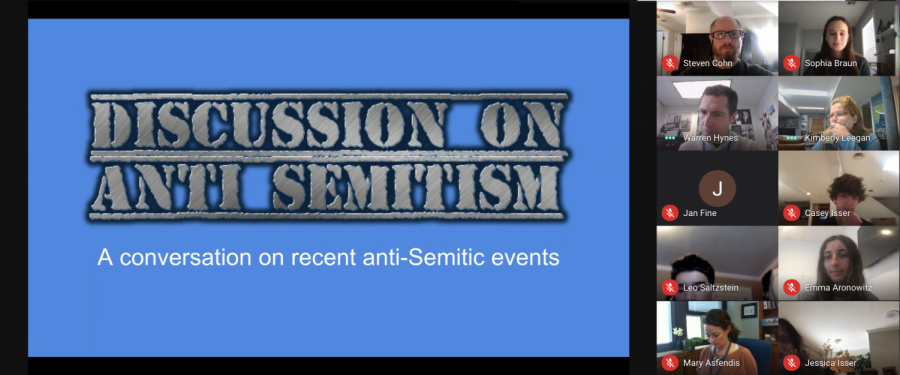Teen activists fight against a local and national rise in anti-Semitism
Photo by Noah Metz
On Feb. 23, WHS students led an online discussion about anti-Semitism
On Feb. 23, Westfield’s No Place for Hate Committee hosted an online discussion about the recent rise in anti-Semitism. Focusing on the Jan. 6 riots that took place at the Capitol, students gave a brief presentation then split participants into breakout groups to further the discussion. Finally, participants reconvened for a final discussion with the whole group. Parents, teachers and students were all invited, and around 50 participants showed up to the Google Meet for the discussion.
Specifically, the Religion and Allyship Subcommittee was in charge of organizing the event. Students in this subcommittee created the discussion questions and presentation. Subcommittee Supervisor and English Teacher Steve Cohn said, “Everyone was looking for images, videos, headlines, quotes, you name it, and discussing the best approach for conveying the direness of the issue and for stimulating meaningful conversation.”
Although the presentation focused specifically on the anti-Semitism at the Jan. 6 riots, such as the rioter who wore a Camp Auschwitz shirt, it also included information regarding the recent uptick in anti-Semitism in Westfield and across the country.
During the presentation, a video was played that detailed the 2017 Charlottesville, South Carolina “Unite the Right” rally, where protestors chanted “Jews will not replace us” and hung Nazi symbols throughout the city. Other anti-Semitic events such as the Tree of Life Synagogue shooting in 2017 and the swastika found in Tamaques Park last November were mentioned during the presentation.
These recent attacks motivated the student organizers to create a safe space for people to share their local experiences with anti-Semitism or reactions to the ongoing hate crimes towards the nation’s Jewish population. WHS sophomore Sophie Braun, who came up with the idea of hosting an event, said, “It’s devastating that these crimes are happening here in Westfield and that either people really feel hatred towards [the Jewish] community or that they are ignorant to what these symbols actually mean. It’s really frustrating to see these repeated offenses because people are not aware of the effect that they have on many individuals in our school and town.”
This was not the first time Westfield students have held a discussion after a traumatic event. No Place for Hate Supervisor and Assistant Principal Warren Hynes said, “There have always been times where certain things are happening in society, and enough kids are riled up about that, a staff member will lead a discussion, and often it has to do with areas of injustice; for example, during the Iraq War and after the killing of Trayvon Martin. These are a couple of examples of times where students and staff have come together to have a dialogue.”
Since the murders of George Floyd and Breonna Taylor, many students have used their voices in person and on social media to speak up about events they felt were unjust or wrong. Recently, after the passing of 16-year-old Carly Jackson of Johns Creek, GA on Feb. 14, many students took to Instagram to share a post from @awiderframe, highlighting that after Jackson’s death, her Instagram comment section was flooded with anti-Semitic rhetoric such as: “Rest in Piss,” “JEW,” and “I love happy endings. I now rest knowing she will be in hell.”
Aly Hitzel, a junior at Johns Creek High School, explained to Hi’s Eye that fellow students had reported the comments left on Jackson’s page and one student even wrote a letter to Mark Zuckerberg asking for him to do something about the comments or remove them from the page. The comments were eventually removed but the people who left them went unpunished, as the comments were left by anonymous troll accounts that couldn’t be identified.
Hitzel explained that the Jewish community in Johns Creek is small but tight-knit with numerous clubs at the school and local synagogues. Hitzel identified that “anti-Semitism is very much alive in Johns Creek. While members of the Jewish community are not targeted every single day, I still believe that it is present all around us.”
From Georgia to New Jersey, anti-Semitism and hateful actions targeting the Jewish community are on the rise. According to police reports, there were 345 reported anti-Semitic “bias incidents” in New Jersey in 2019. This is the highest number of incidents for one religion, and second, only to Anti-Black bias incidents reported. According to the 2019 FBI hate crime statistics, there were more hate crimes against Jewish people than every other religious group combined.
No matter the location, teachers, and students both acknowledge the importance of analyzing hateful and anti-Semitic actions in order to not only bring awareness but to prevent the spread of hate in the future. Cohn said, “Anti-Semitism isn’t something that’s happening in some faraway place; we’re seeing it right here in Westfield and throughout New Jersey and the rest of the country. The goal is to get to a place where we’re taking action in the fight against anti-Semitism.”

